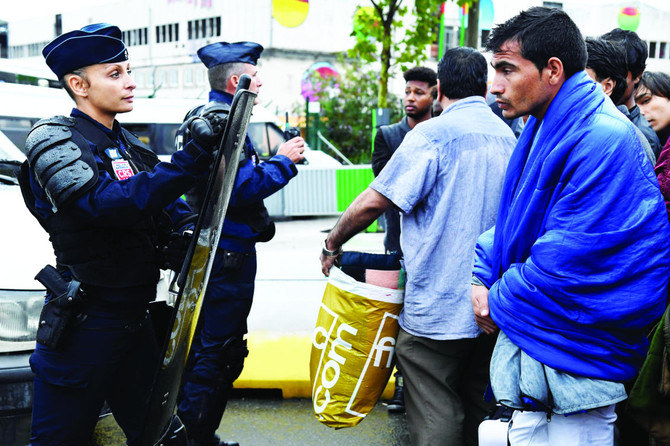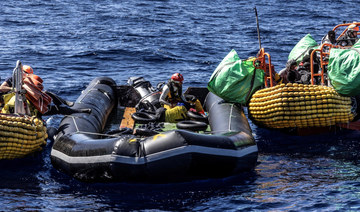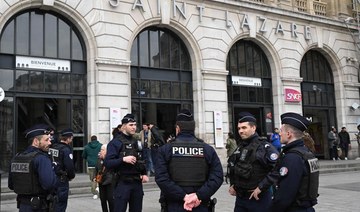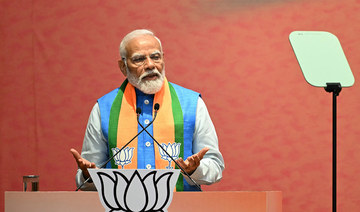VIRTY-SUR-SEINE, France: “The police arrived at 7am and said to us ‘get in the bus’,” Ali, a refugee from war-torn Sudan, remembers of the morning that police raided the squat he was living in last April in northern Paris along with 500 other migrants.
Despite having a job and refugee status, he was ordered on to the vehicle.
“We didn’t have any choice,” he explained.
Along with others scooped up at the disaffected office building, he was told he was being sent by bus to Toulouse — a nearly 700-kilometer (435-mile) trip of seven or eight hours to the southwest.
“They (the police) went from room to room to tell us to get out, then they took our identity documents and said ‘get in the bus’,” he added in an interview with AFP. “It was impossible to get out of it. They were saying we had to hurry up.”
Ali, who has a job as a cleaner at Disneyland Paris earning 1,400 euros ($1,500) a month, had been caught up in the French government’s policy of sending migrants from the capital to regional towns.
It was announced by French President Emmanuel Macron in September 2022 during a speech in which he criticized the idea of concentrating refugees and migrants in low-income and troubled neighborhoods of Paris as “absurd.”
Rather than adding strain to the stretched social services of these areas, he argued that asylum seekers and refugees could help reverse declining populations and labor shortages in other areas of the country.
Some charities welcomed the idea in principle, but worried about the implementation.
It caused immediate fury among anti-immigration politicians, and many charities now suspect Macron and his ministers of wanting to clean up Paris ahead of the Olympic Games this July and August — which the government denies.
Ali’s experience demonstrates the difficulties of relocating people.
He didn’t know Toulouse and, once he arrived there, he was taken to an asylum seekers’ center where he was told he couldn’t stay for longer than four days.
Because he had already obtained refugee status, he was also informed that he shouldn’t be there “along with 17 other refugees” who had been transported from Paris, he remembers.
“I explained that I didn’t know where to go and that I didn’t know anyone. They told me ‘it’s not our problem’,” he explained from his new home, an office building in Vitry-sur-Seine in southeast Paris occupied by 400 migrants.
Soon after arriving in the southwest, he bought a return ticket to Paris and managed to save his job at Disneyland.
Abdallah Kader, a 51-year-old from Chad in northern Africa, was another person evacuated from the Ali’s squat on the Ile-Saint-Denis, an area of Paris that will host the Olympic village during the Games.
Also with refugee status, he was sent to Bordeaux in southwest France, but decided to return to the capital soon after.
“I know people here. We help each other. I find work,” he said in Vitry-sur-Seine where he sleeps in a small former office with another refugee.
Abdallah was once employed as a security guard at one of the many building sites around Paris linked to the Olympic Games which kick off on July 26.
Several charities are convinced that the migrant transfers are linked to a desire among French authorities to banish rough-sleeping, tents and squats from the capital before the eyes of the world fall on its famed cobbled streets.
In February, an umbrella group of 80 French NGOs denounced what it called the “social cleansing” of Paris ahead of the Olympics with efforts to remove migrants, the homeless and sex workers.
“Clearly ahead of the Olympics, there are transfers, a social clean up to prepare the city for the arrival of tourists,” Jhila Prentis, a volunteer at United Migrants, a charity that works in Vitry-sur-Seine.
The group wants the state to run more checks before sending people to provincial France “so that it meets their needs and that they agree to leave,” she added, explaining that often “they have a life here.”
France logged 167,000 requests for asylum last year and Macron is under constant pressure from right-wing political opponents and public opinion to reduce immigration.
Housing Minister Guillaume Kasbarian told parliament on Tuesday that 200,000 homeless people slept each night in shelters provided by the French state, with 100,000 of these places in the capital region.
“Given the saturation in the Paris region, not everyone can find a place,” he added. “That’s why, without any link to the Olympic Games, the government put in place a dispersal policy from March 2023,” he explained.
Refugees caught up in Paris clean-up drive
https://arab.news/wh85y
Refugees caught up in Paris clean-up drive

- Ali, who has a job as a cleaner at Disneyland Paris earning $1,500 a month, had been caught up in the French government’s policy of sending migrants from Paris to regional towns
- Some charities welcomed the idea in principle, but worried about the implementation
Blinken in Ukraine on unannounced visit to show US support

- Blinken arrived by overnight train from Poland and was due to meet with Ukrainian President Volodymyr Zelensky
Marking his fourth visit to Kyiv since the start of the Russian invasion in February 2022, Blinken arrived by overnight train from Poland and was due to meet with Ukrainian President Volodymyr Zelensky, according to an AFP journalist accompanying him.
The visit comes just weeks after the US Congress finally approved a $61 billion package of financial aid for Ukraine after months of political wrangling, unlocking much-needed arms for the country’s stretched troops.
The aid is expected to flow at an accelerated pace as Washington seeks to make up for lost months while Congress struggled to agree on assistance.
“First this trip is to send a strong signal of reassurance to the Ukrainians who are obviously in a very difficult moment both with grinding battle on the Eastern Front but also with the Russians now expanding some cross-border attacks into Kharkiv,” a senior US official who spoke on condition of anonymity told reporters aboard the train.
The secretary intends in particular to detail how US aid will “be executed in a fashion to help shore up their defenses and enable them to increasingly take back the initiative on the battlefield.”
The last visit by a senior US official was in March, when National Security Adviser Jake Sullivan went to Ukraine.
Russia is “clearly throwing everything they have in the east and expanding the fighting to Kharkiv is representative of that strategy,” the official said.
“But we have a lot of confidence that the Ukrainians will increasingly be effective in pushing the Russians back as our assistance flows in both from the United States and other allies and partners.”
In addition to holding talks with Zelensky, Blinken is expected to meet with his counterpart Dmytro Kuleba as well as members of the civil society and additionally deliver a speech focused on “Ukraine’s strategic success.”
Also up for discussion is a bilateral defense agreement that the United States hopes to conclude before the NATO summit in Washington in July.
“The negotiations are in their final stages, we’re very close,” the US official said.
Biden signs ban on imports of Russian nuclear reactor fuel into law

- Russia is the world’s top supplier of enriched uranium, and about 24 percent of the enriched uranium used by US nuclear power plants come from the country
WASHINGTON: President Joe Biden signed a ban on Russian enriched uranium into law on Monday, the White House said, in the latest effort by Washington to disrupt President Vladimir Putin’s invasion of Ukraine.
The ban on imports of the fuel for nuclear power plants begins in about 90 days, although it allows the Department of Energy to issue waivers in case of supply concerns.
Russia is the world’s top supplier of enriched uranium, and about 24 percent of the enriched uranium used by US nuclear power plants come from the country.
The law also unlocks about $2.7 billion in funding in previous legislation to build out the US uranium fuel industry.
“Today, President Biden signed into law a historic series of actions that will strengthen our nation’s energy and economic security by reducing, and ultimately eliminating, our reliance on Russia for civilian nuclear power,” Jake Sullivan, the national security adviser, said in a statement.
Sullivan said the law “delivers on multilateral goals we have set with our allies and partners,” including a pledge last December with Canada, France, Japan and the United Kingdom to collectively invest $4.2 billion to expand enrichment and conversion capacity of uranium.
The waivers, if implemented by the Energy Department, allow all the Russian uranium imports the US normally imports through 2027.
Police aim to break up pro-Palestine protests in Amsterdam

- The Eindhoven University of Technology confirmed that there were “dozens of students peacefully protesting outside next to ten to 15 tents”
AMSTERDAM: Police moved in to end a pro-Palestinian protest at the University of Amsterdam on Monday after protesters occupied university buildings in various Dutch cities to condemn Israel’s war in Gaza, ANP news agency reported.
Earlier on Monday, a Dutch protest group said it had occupied university buildings in the Dutch cities of Amsterdam, Groningen and Eindhoven.
In a post on social media site X, Amsterdam police said the university had filed a police report against the protesters for acts of vandalism.
Police made sure no one entered the university buildings and asked protesters to leave the premises voluntarily.
A spokesperson for the University of Amsterdam confirmed the occupation and said it had advised people not affiliated with the protest to leave the building.
The Eindhoven University of Technology confirmed that there were “dozens of students peacefully protesting outside next to ten to 15 tents.”
Students in the Netherlands have been protesting against Israel’s war in Gaza since last Monday and Dutch riot police had previously clashed with protesters at the University of Amsterdam.
Students in the US and Europe have also been holding mostly peaceful demonstrations calling for an immediate permanent ceasefire and for schools to cut financial ties with companies they say are profiting from the oppression of Palestinians.
Ukraine’s first lady and foreign minister visit Russia-friendly Serbia

- Although Serbia has condemned the Russian aggression on Ukraine, it has refused to join international sanctions against Moscow
BELGRADE, Serbia: Ukrainian Foreign Minister Dmytro Kuleba made a surprise visit to Russia-friendly Serbia on Monday, together with Ukraine’s first lady, Olena Zelenska, in a sign of warming relations between the two states.
On his first visit to Serbia since the start of the Russian aggression on Ukraine in 2022, Kuleba met Serbian President Aleksandar Vucic and new Serbian Prime Minister Milos Vucevic, whose government includes several pro-Russian ministers, including two who have been under US sanctions.
A statement issued by the prime minister’s office after the talks said that “Serbia is committed to respecting international law and the territorial integrity of every member state of the United Nations, including Ukraine.”
Although Serbia has condemned the Russian aggression on Ukraine, it has refused to join international sanctions against Moscow and has instead maintained warm and friendly relations with its traditional Slavic ally.
Serbia has proclaimed neutrality regarding the war in Ukraine, and its authorities repeat that Serbia does not supply weapons to any parties. However, there are reports that Serbia has delivered weapons to Ukraine through intermediary countries. The visit by Kuleba and Zelenska, who toured the Serbian capital with Serbian first lady Tamara Vucic on Sunday, was met with criticism in Moscow. Comments by readers in the Russian state-run media such as “shameful” were published by RIA Novosti.
In what appears to be damage control, soon after his talks with Kuleba on Monday, Vucevic was to meet the Russian ambassador to Belgrade and the two were to tour a big storage facility for Russian gas that is being imported to Serbia.
Pro-Russian President Vucic has informally met Ukrainian President Volodymyr Zelenskyy three times on the sidelines of international conferences. Serbia has supplied Ukraine with humanitarian and financial aid.
Vucic has for years claimed to follow a “neutral” policy, balancing ties among Moscow, Beijing, Brussels and Washington. Although he has repeatedly said that Serbia is firm on its proclaimed goal of seeking European Union membership, under his authoritarian rule the Balkan country appears to be shifting closer to Russia and especially China.
During a high-stakes visit by Chinese President Xi Jinping to Belgrade last week, China and Serbia signed an agreement to build “ironclad” relations and a “shared joint future.”
Modi’s BJP skips Kashmir as Indian election enters fourth phase

- Millions of Indians across 96 constituencies began voting on Monday
- Ruling party is not fighting elections in Kashmir for first time in 30 years
NEW DELHI: India’s ruling Bharatiya Janata Party is not contesting elections in the Muslim-majority region of Kashmir for the first time in nearly three decades, as voting in the latest round of the national polls got underway on Monday.
The world’s most populous country began voting on April 19 in a seven-phase election that is scheduled to take place over six weeks, with ballots set to be counted on June 4.
India has 968 million people eligible to vote in the general election, where incumbent Prime Minister Narendra Modi and his Hindu nationalist BJP are aiming for a rare third consecutive term in power.
Monday’s voting involved 96 constituencies in the fourth round of polling.
While the BJP, which has been in power since 2014, and its allies are contesting every other part of India as they look to secure a majority of the 543 parliamentary seats, the party is sitting out in the northern Himalayan territory of Jammu and Kashmir.
This year marks the region’s first election since Modi’s government stripped the valley of its special autonomous status and statehood — which was granted by the Indian Constitution — on Aug. 5, 2019. The move unilaterally revoked the relevant provisions under Article 370, scrapping Kashmir’s flag, legislature, protections on land ownership and fundamental rights, sparking fears of demographic engineering in the region.
“It’s really surprising that the BJP, which claimed to have over 800,000 cadres in the valley, failed to find a single candidate. It shows that the BJP is not popular in the valley,” Sanjay Tickoo, the Srinagar-based leader of the Hindu minority group Kashmiri Pandit, told Arab News.
“I am expecting a record turnout to show the central government what (they) have done to the people of Jammu and Kashmir. This is the reflection of anger … no one is happy in the valley after the abrogation of Article 370.”
Indian-controlled Jammu and Kashmir is part of the larger Kashmiri territory, which has been the subject of international dispute since the 1947 partition of the Indian subcontinent into Hindu-majority India and Muslim-majority Pakistan. Both countries claim Kashmir in full and rule in part.
Modi said his government had been focusing on jobs and development as part of an effort to end violence in the valley, which has for decades witnessed outbreaks of separatist insurgencies to resist control from the government in New Delhi.
But after the BJP lost Kashmir’s three seats in the 2019 election, the party’s popularity slid further after it revoked the region’s autonomous status later the same year and subsequently imposed months of strict communication blockade and jailed hundreds of political leaders.
“The vote expresses not only anger but also apprehension against the anti-Muslim rants that have been going on as well as whatever they have done in Kashmir,” Professor Sheikh Showkat, a Srinagar-based political analyst, told Arab News.
Altaf Thakur, BJP spokesperson in Kashmir, said the party was still taking part in the Kashmir polls by supporting other regional parties.
“It is not correct to say that we are not fighting the election, we are playing the role of kingmaker and whichever way the cadres of the BJP will go, we will win,” he told Arab News.
“It’s not important whether we stand in the elections or not, the important thing is that we have to defeat the dynasty rulers,” he said, referring to the main contenders in the Kashmir polls, the National Conference and People’s Democratic Party.
While they are fighting each other in the valley, both parties have said they oppose the BJP and are part of the Congress party-led opposition alliance, known as India.
For some Kashmiri voters, Monday’s vote was about speaking up for themselves.
“The BJP knew that they cannot tolerate the wrath of the people of Kashmir. They fled the contest without a fight,” Aijaz Ahmed, a businessman from Srinagar, told Arab News.
“I voted today because it gave me an opportunity to express myself and tell the government in Delhi that you cannot keep us silenced. We want an atmosphere without fear and a region where our own identity is not questioned.”




















